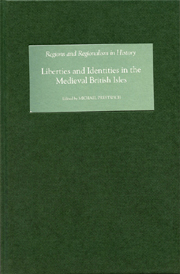Book contents
- Frontmatter
- Contents
- List of maps
- Abbreviations
- Introduction
- 1 States, liberties and communities in medieval Britain and Ireland (c.1100–1400)
- 2 Arbitration and Anglo-Scottish border law in the later middle ages
- 3 Peacekeepers and lawbreakers in medieval Northumberland, c.1200–c.1500
- 4 War, lordship, and community in the liberty of Norhamshire
- 5 The lordship of Richmond in the later middle ages
- 6 ‘Tam infra libertates quam extra’: Liberties and military recruitment
- 7 Neighbours from Hell? Living with Tynedale and Redesdale, 1489–1547
- 8 Striving for Marcher liberties: The Corbets of Caus in the thirteenth century
- 9 Franchises north of the border: Baronies and regalities in medieval Scotland
- 10 The liberties of Ireland in the reign of Edward I
- Index
6 - ‘Tam infra libertates quam extra’: Liberties and military recruitment
Published online by Cambridge University Press: 12 September 2012
- Frontmatter
- Contents
- List of maps
- Abbreviations
- Introduction
- 1 States, liberties and communities in medieval Britain and Ireland (c.1100–1400)
- 2 Arbitration and Anglo-Scottish border law in the later middle ages
- 3 Peacekeepers and lawbreakers in medieval Northumberland, c.1200–c.1500
- 4 War, lordship, and community in the liberty of Norhamshire
- 5 The lordship of Richmond in the later middle ages
- 6 ‘Tam infra libertates quam extra’: Liberties and military recruitment
- 7 Neighbours from Hell? Living with Tynedale and Redesdale, 1489–1547
- 8 Striving for Marcher liberties: The Corbets of Caus in the thirteenth century
- 9 Franchises north of the border: Baronies and regalities in medieval Scotland
- 10 The liberties of Ireland in the reign of Edward I
- Index
Summary
It is often said that the medieval state was concerned above all with two things, law and war. In the history of law, liberties have a large place; the extent to which the English crown was prepared to devolve legal authority was remarkable. Half the hundreds at the end of the thirteenth century were in private hands. The powers of great liberty holders were very impressive, and many examples could be given. The greatest might combine freedom from both secular and religious authorities. At Bury St Edmunds, the abbot exercised all the authority that a sheriff would normally possess over eight and a half hundreds in West Suffolk. Within this area lay the liberty itself. There no royal official could act; all power lay with the abbot. Bury was also an ecclesiastical liberty, dependent directly on the pope and free from any episcopal interference. The liberty of St Etheldreda, belonging to the see of Ely, was another from which all royal officials were excluded. The bishop's justices heard all pleas, including pleas of the crown. Cases were successfully removed by the bishop from the jurisdiction of King's Bench, and of Common Pleas.
When it came to war, one argument is that the scale of the franchises of the Welsh March and the north of England is to be explained, at least in part, by military need.
- Type
- Chapter
- Information
- Liberties and Identities in the Medieval British Isles , pp. 111 - 119Publisher: Boydell & BrewerPrint publication year: 2008



